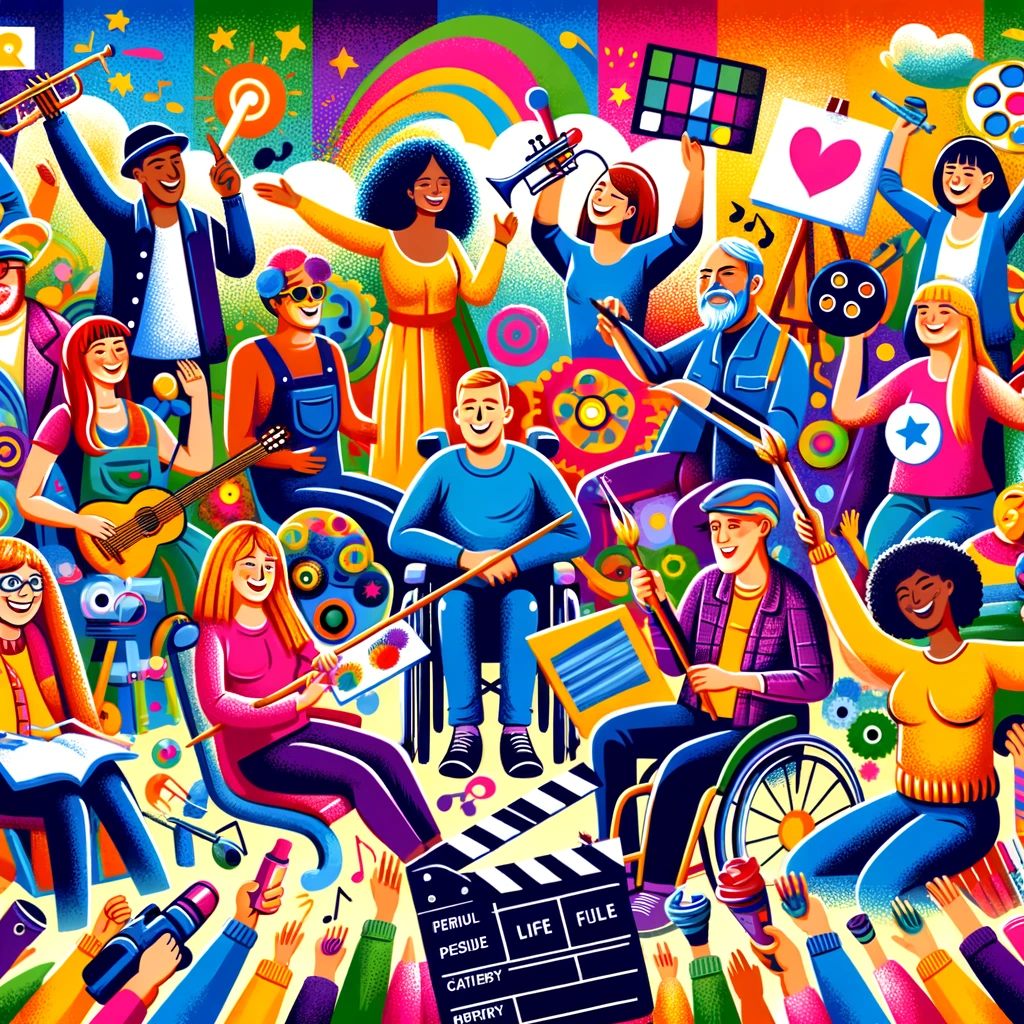Discover a groundbreaking showcase of inclusivity in film with Disability Horizons’ 16 films and documentaries selection.
This list celebrates authentic representation by featuring disabled characters brought to life by talented disabled actors. From inspiring stories of resilience and adventure to powerful narratives of personal growth, these films break barriers and offer a window into diverse experiences. Dive into this curated collection of representation that truly resonates.
Although the film industry has progressed when it comes to bringing disability issues onto the big screen, it is still far from an inclusive field that allows disabled characters to be represented by disabled actors.
Our writer, Raya Al-Jadir, did some digging and has put together a list of 10 films and documentaries with disabled characters played by disabled actors that are a must-watch for anyone interested in disability representation in the film industry. 6 more suggestions have been updated in 2024.
1. CODA
CODA – which stands for Children of Deaf Adults – is a comedy-drama film written and directed by Sian Heder. It is an English-language remake of the 2014 French-Belgian film La Famille Bélier.
Ruby Rossi (played by actor Emilia Jones) is the daughter of deaf parents and sister to a deaf brother. She is the only hearing member of the family.
She attempts to help her family’s struggling fishing business while pursuing her own aspirations of being a singer.
The film features deaf actors Marlee Matlin as Ruby’s mother Jackie, Troy Kotsur as Ruby’s father Frank and Daniel Durant as Ruby’s brother Lee.
In 2022, CODA won three Academy Awards including Best Picture, Best Writing for Sian Hede and Best Supporting Actor for Troy Kotsur.
You can watch CODA on AppleTV+.
2. The Peanut Butter Falcon
This film follows Zach Gottsagen’s character, Zak, as he escapes his assisted living facility where he was abandoned by his family because of his Down’s syndrome.
Zak begins his journey to pursue his dream of becoming a professional wrestler and, on his journey, he meets and befriends a man named Tyler (Shia LaBeouf) who is also on the run. The pair become best friends as Tyler helps Zak achieve his dream.
You can watch The Peanut Butter Falcon on Amazon Prime.
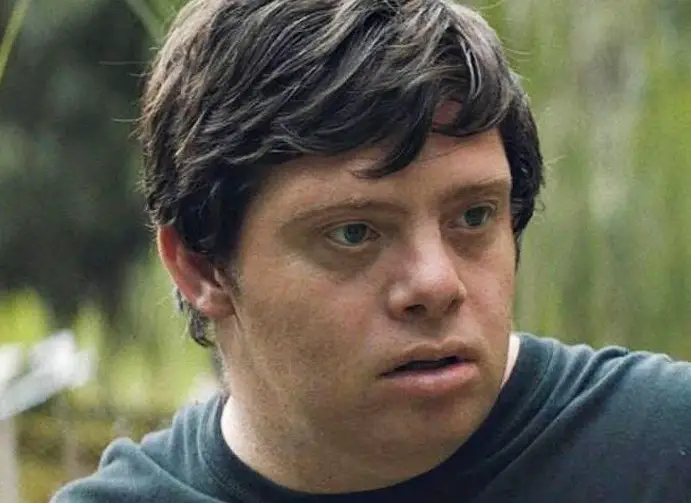
3. Run
Kiera Allen stars alongside Sarah Paulsen in the 2020 thriller Run. Kiera plays Chloe, who is kidnapped at birth from a maternity ward by Sarah’s character, Diane, after her newborn baby dies.
This leads to Diane overdosing Chloe on unnecessary medications to make her paralysed, diabetic and living with other health conditions.
Aged 17 and homeschooled all her life, Chloe eventually uncovers the truth and tries to escape.
Kiera acquired her disability when she was a teenager and, like her character Chloe, she is a wheelchair user.
You can watch Run on Netflix.
4. Children of a Lesser God
This movie follows the turbulent relationship between a deaf woman and a hearing man as they struggle to communicate. Sarah (played by CODA star Marlee Matlin) uses American Sign Language to communicate.
Marlee was recognised for her work in this movie and won Best Actress at the 59th Academy Awards.
You can buy or rent Children of a Lesser God on Amazon Prime.
5. Cyrano
American actor Peter Dinklage – best known for roles in Game of Thrones, The Station Agent, Elf and X-Men – was born with a type of dwarfism called achondroplasia.
Peter stars as the wordsmith Cyrano in the 2022 musical romantic drama Cyrano. In the story, Cyrano helps a young man Christian woo a girl by writing love letters.
The film is directed by Joe Wright and with a screenplay by Erica Schmidt. It is based on Schmidt’s 2018 stage musical of the same name, which is based on the 1897 Edmond Rostand play Cyrano de Bergerac.
You can watch Cyrano on Amazon Prime.
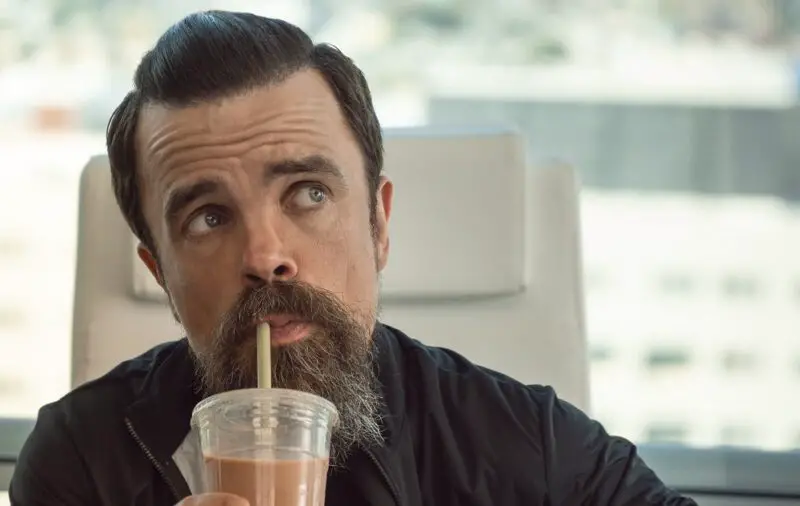
6. Then Barbara Met Alan
Then Barbara Met Alan is a factual drama that tells the true story of two disability activists – Barbara Lisicki and Alan Holdsworth – who became the trailblazers for disability rights in Britain and help make the Government create the Disability Discrimination Act (DDA).
Written by multiple BAFTA-winner Jack Thorne alongside actor turned writer Genevieve Barr, Then Barbara Met Alan stars BAFTA-nominated Ruth Madeley as the comedian and activist Barbara Lisicki and Arthur Hughes as the singer-songwriter and activist Alan Holdsworth – all of whom have a disability and/or health condition themselves.
You can watch Then Barbara Met Alan on BBC iPlayer.
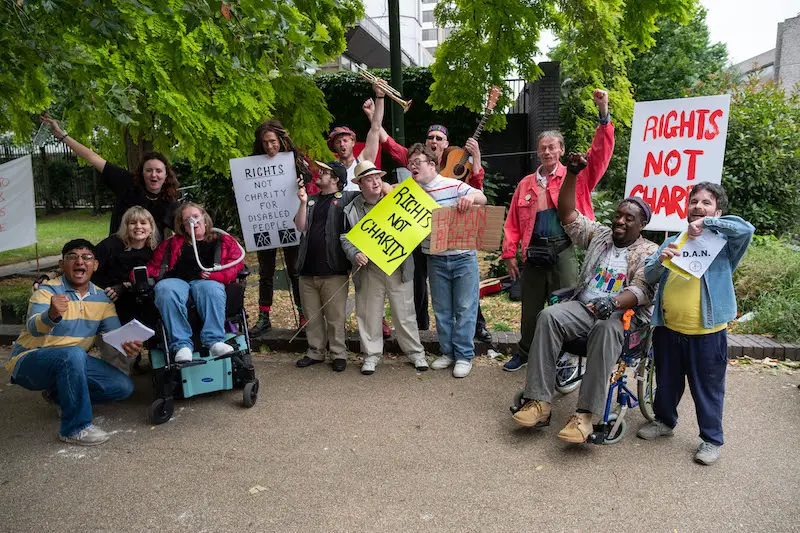
7. A Space in Time
This poignant documentary about two young brothers with Duchenne muscular dystrophy celebrates the power of love and togetherness. It is a deeply personal documentary that raises awareness about a disability without neglecting the interiority of those living with the condition.
Co-directed by Riccardo Servini and Nick Taussig, the film follows the Taussig family’s experience with Duchenne muscular dystrophy, a genetic disorder that affects their young sons, Theo and Oscar.
A family, facing the diagnosis of a progressive muscle wasting condition for their two sons, embark on a journey to create a magical home for them, intended to nurture and enable not disable them further.
A Space in Time shows how the family have carried out the slow and demanding day-to-day work of adapting their world.
They hired architects to create a purpose-built home and have revolutionised their own preconceived ideas about what constitutes a well-lived life.
Intimate and candid, this awareness-raising documentary does not skirt around the tough realities of Duchenne or fall back on easy sentiment, as it shows that disability need not be synonymous with tragedy.
You can watch A Space in Time on Amazon Prime.
8. Hearing Is Believing
Hearing Is Believing is a new feature documentary from award-winning filmmaker Lorenzo DeStefano. It introduces the world to the astonishing young musician and composer, Rachel Flowers.
Born 15 weeks premature, Rachel soon lost her eyesight. At the age of two, she began playing every song she heard by ear, including Bach’s fugues.
The film revels in Rachel’s joyous and free-flowing love of song, illuminating the bonds of family and the divine mysteries of creativity.
The great musicians appearing with Rachel include Grammy winners Dweezil Zappa, Arturo Sandoval, Stevie Wonder, Grammy-nominated jazz pianist Taylor Eigsti, the late Progressive Rock icon Keith Emerson and 50 members of the Santa Barbara Youth Symphony.
You can purchase Hearing Is Believing on DVD or Blu-ray from Amazon.
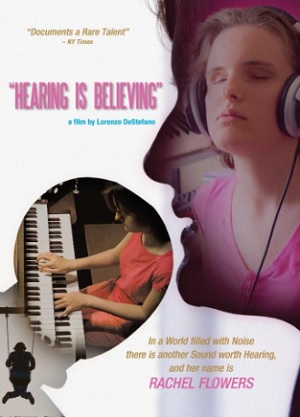
9. Crip Camp
Crip Camp starts in 1971 at Camp Jened, a summer camp in New York Stae described as a “loose, free-spirited camp designed for teens with disabilities”.
Starring Larry Allison, Judith Heumann, Jim LeBrecht, Denise Sherer Jacobson and Stephen Hofmann, the film focuses on those campers who turned themselves into activists for the disability rights movement and follow their fight for accessibility legislation.
You can watch Crip Camp on Netflix.
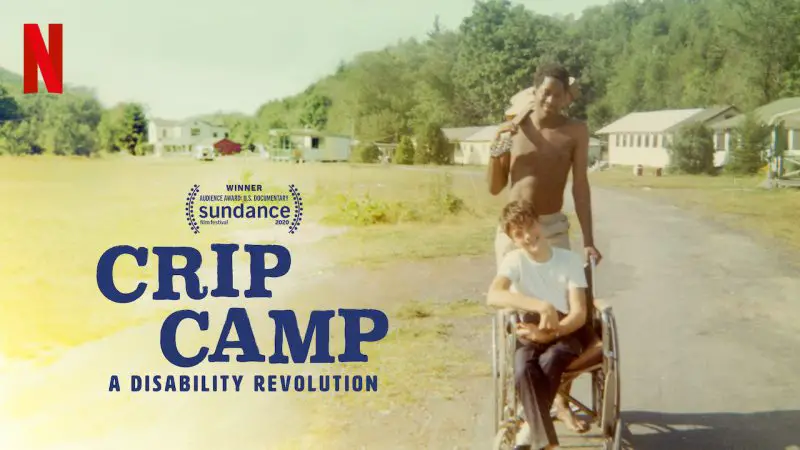
10. Four Weddings and a Funeral
The 1994 British romantic comedy film directed by Mike Newell is the first of several films by screenwriter Richard Curtis to feature Hugh Grant.
It follows the adventures of Charles (Grant) and his circle of friends through several social occasions as they each encounter romance.
The role of David is played by David Bower, a Welsh actor who is deaf and a BSL user and took his degree in the British Theatre of the Deaf (established by Pat Keysell)
You can buy or rent Four Weddings and a Funeral on Amazon Prime.
What other films with disabled actors would you recommend? Let us know on Facebook and Twitter @DHorizons.
By Raya-Al-Jadir
Updated 2024: Identifying pioneers and milestones in disability representation
Some key historical milestones in authentic disability representation include:
In the 1980s and 1990s, disability activists protested the Jerry Lewis MDA telethon for its stereotypical and demeaning portrayals of people with disabilities. This helped raise awareness of the need for more authentic representation.
In 1986, Marlee Matlin became the first deaf actress to win an Academy Award for her role in Children of a Lesser God
This was a major milestone showing disabled actors could succeed in Hollywood.
The passage of the Americans with Disabilities Act (ADA) in 1990 prohibited discrimination against people with disabilities and helped increase visibility and opportunities for disabled Americans, including in entertainment.
The 2005 documentary Murderball, about wheelchair rugby players, featured a cast of disabled athletes and was nominated for an Academy Award
It helped show disabled people as multi-dimensional.
More films and series with disabled actors
In addition to the 10 films/series highlighted, there are many other notable examples of authentic disability representation worth checking out, such as:
Feeling Through (2020) – Academy Award-nominated short film starring Robert Tarango, the first DeafBlind actor to be in a film.
Ramy (Hulu series) – Features Steve Way, a disabled actor with muscular dystrophy, in a prominent supporting role
Loudermilk (Amazon series) – Stars Mat Fraser, a disabled actor with thalidomide-induced phocomelia
The Politician (Netflix series) – Ensemble cast includes Ryan Haddad, an actor with cerebral palsy
Deaf U (Netflix reality series) – Follows a group of students attending Gallaudet University, a private college for the deaf and hard of hearing
This Close (Sundance Now series) – Created by and starring Shoshannah Stern and Josh Feldman, both of whom are deaf
While there is still a long way to go, the growing number of films and series providing substantial roles for disabled actors shows the progress being made. With continued advocacy and support, even more opportunities will open up for disabled talent to showcase their skills and share their stories
How can film makers provide more opportunities for disabled actors?
Here are some ways to provide more opportunities for disabled actors to play disabled characters:
1. Actively seek out disabled talent in casting calls. Make it clear in casting notices that performers with disabilities are encouraged to audition for disabled roles. Specify what accommodations can be provided during the audition process. Work with disability-specific talent agencies and organizations to reach a wider pool of disabled actors.
2. Give disabled actors the chance to audition for disabled roles, rather than defaulting to able-bodied stars. While big name actors may have box office draw, authenticity matters. At least consider disabled performers before making final casting decisions.
3. Hire disabled talent behind the camera as well, such as writers, directors, and producers. They can help ensure authentic, non-stereotypical portrayals and advocate for disabled actors. Involve the disability community throughout the creative process.
4. When a non-disabled actor is cast as a disabled character, work with consultants and coaches from the disability community to inform the performance. But recognize this is not a full substitute for authentic representation.
5. Create more opportunities for disabled actors to play all types of roles, not just disability-specific ones. Abilities should be considered secondary to acting talent. Disabled characters should be incorporated organically into storylines.
6. Improve physical accessibility and accommodations on sets, at auditions, and at rehearsals. Make it standard practice to ask all actors if they require any accommodations to fully participate.
7. Educate decision-makers in the industry about the importance of authentic representation. Confront biases and assumptions that disabled actors are less capable or marketable. Highlight examples of successful disabled performances.
8. Increase disability representation in casting director and talent agent roles. They serve as important gatekeepers and advocates.
In summary, the industry must actively prioritize disability inclusion in all aspects of the creative process, from writing to casting to accommodations on set. Disabled performers should be sought out, given equal opportunity to audition, and considered based on their acting abilities. Authentic representation should become the norm, not the rare exception. Systemic change is needed to make the performing arts accessible and equitable for disabled talent.
Further Reading about casting disabled actors and disability representation in film:
Defeating The Arguments Against Authenticity When Casting People with Disabilities by Bekah Harbison (OnStage Blog)
In this article, Harbison, a theatre director, discusses the importance of authentic casting when it comes to performers with disabilities. She refutes common arguments against disability-inclusive casting and emphasizes that disabilities are an integral part of many individuals’ identities, not simply acting choices.
Best Practices for Inclusive Casting by Kelsey Mesa (TheatreArtLife)
This comprehensive guide, written by a former Diversity & Inclusion office staff member at Actors’ Equity Association, provides actionable tips for inclusive casting throughout the production process. Mesa stresses the importance of selecting diverse stories, specifying diversity in breakdowns, advocating against casting non-disabled actors as disabled characters, and more.
More on Disability Horizons…

